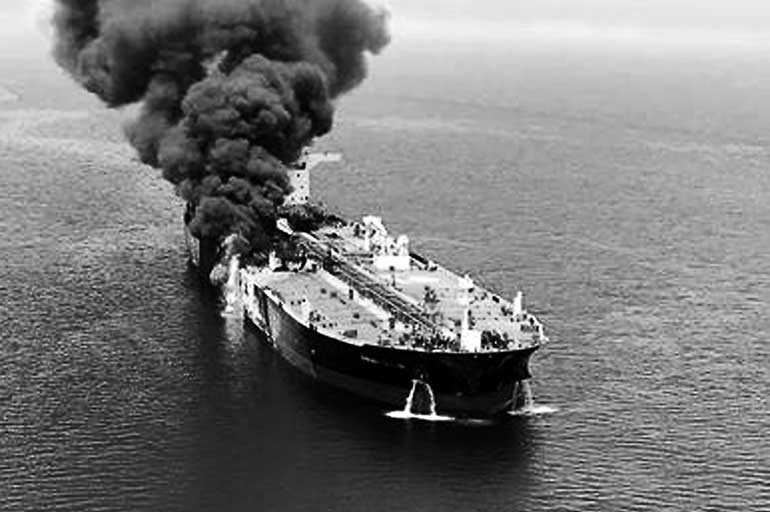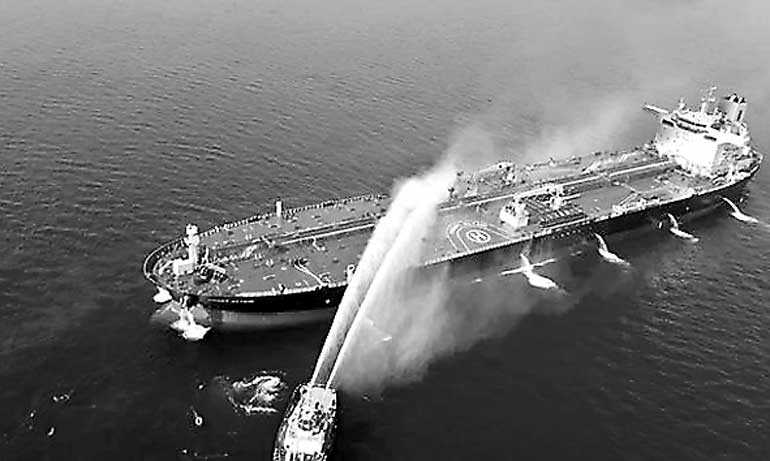Tuesday Feb 24, 2026
Tuesday Feb 24, 2026
Saturday, 15 June 2019 02:45 - - {{hitsCtrl.values.hits}}

An oil tanker is seen after it was attacked at the Gulf of Oman, in waters between Gulf Arab states and Iran - Reuters
DUBAI (Reuters): Iran said on Friday it was alarming and wrong of the United States to blame Tehran for attacks on two oil tankers at the entrance to the Gulf, after an incident that has raised concerns about a new confrontation in the vital oil shipping route.
Washington released a video that it said showed Iran’s Revolutionary Guards were behind Thursday’s attacks near the Strait of Hormuz on the Norwegian-owned Front Altair, which was set ablaze, and the Japanese-owned Kokuka Courageous.
Both vessels were adrift in the Gulf of Oman on Friday, after their crews abandoned ship following the attacks that caused a spike in oil prices.
A fire that had raged on the Front Altair, which carried a cargo of petrochemical feedstock naphtha, had been extinguished, the owner said. The blaze left a blackened scar along the hull.
About a fifth of the oil consumed globally passes through the Strait of Hormuz, shipped from Gulf energy producers, including Saudi Arabia, the world’s biggest crude exporter.
The US military said a black-and-white video filmed from a US aircraft showed Guards on one of their patrol boats drawing up to the Kokuka Courageous, after blasts struck both vessels, and removing an unexploded limpet mine from the hull.
“It is the assessment of the United States government that the Islamic Republic of Iran is responsible for the attacks that occurred in the Gulf of Oman,” US Secretary of State Mike Pompeo told reporters.
He said the assessment was based on intelligence, the weapons used, expertise required and similar recent attacks.
Washington has blamed Iran or its proxies for attacks on May 12 that crippled four oil tankers in the same area. It also said Tehran was behind May 14 drone strikes on two Saudi oil-pumping stations. Tehran has denied all the charges.
“These accusations are alarming,” Iranian Foreign Ministry spokesman Abbas Mousavi said, adding that blaming Iran for Thursday’s attacks was “the simplest and the most convenient way for Pompeo and other US officials.”
“We are responsible for ensuring the security of the Strait and we have rescued the crew of those attacked tankers in the shortest possible time,” he said, Iranian state radio reported.
'Warmongering'
Tehran has also said the United States and regional allies, such as Iran’s regional rivals Saudi Arabia and the United Arab Emirates, were “warmongering” by making such charges.
In comments directed at Iran, the UAE minister of state for foreign affairs, Anwar Gargash, said on Twitter: “De-escalation in current situation requires wise actions not empty words.” US and European security officials, as well as regional analysts, have cautioned against jumping to conclusions, leaving open the possibility that Iranian proxies, or someone else entirely, might have been responsible for Thursday’s attacks.
Britain said it took the matter “extremely seriously” and, if Iran was involved, “it is a deeply unwise escalation.”
Iranian-US tensions began ratcheting up after US President Donald Trump pulled out of a deal last year between Iran and global powers that aimed to curb Tehran’s nuclear ambitions in exchange for relief from international sanctions.
Since then Washington has toughened its sanctions regime, seeking to force Iran’s oil customers to slash their imports.
Iran’s crude exports fell to about 400,000 barrels per day (bpd) in May from 2.5 million bpd in April 2018, draining Tehran’s main source of revenues and hurting an economy already weakened by years of isolation.
Iran has repeatedly warned it would block the Strait of Hormuz, a narrow channel between the Iranian and Omani coastlines, if it is barred from selling oil.
The Trump administration said in May it would send troops and other forces to the Middle East, citing Iranian threats.
Tehran has called the move “psychological warfare” and said the US moves offered more of a target than a threat to Iran.
Responding to rising regional tension, UN Secretary-General Antonio Guterres told a UN Security Council meeting on Thursday that the world could not afford “a major confrontation in the Gulf region”.
Iran and the United States have both said they want to avoid a war.
Iranian President Hassan Rouhani said on Wednesday before that attacks: “Iran will never initiate a war but will give a crushing response to any aggression.”
US Central Command said on Thursday: “We will defend our interests, but a war with Iran is not in our strategic interest, nor in the best interest of the international community.”
Pompeo said US policy was to make economic and diplomatic efforts to bring Iran back to negotiations on a broader deal.
Thursday’s attack took place while Japanese Prime Minister Shinzo Abe was visiting Tehran with a message from Trump. Japan was a big Iranian oil importer until Trump stepped up sanctions.
But Iran dismissed Trump’s overture, details of which were not made public. “I do not see Trump as worthy of any message exchange, and I do not have any reply for him, now or in future,” Iranian Supreme Leader Ali Khamenei said.
In abandoning the nuclear deal, Trump said he wanted Iran to curb its nuclear work and development of missiles, as well as halt support for proxy forces in Iraq, Syria, Lebanon and Yemen.
Regional analysts said Iran could have carried out the attacks in a bid to gain negotiating leverage.
“There is always the possibility that somebody is trying to blame the Iranians,” said Jon Alterman of Washington’s Center for Strategic and International Studies.
“But there is the greater likelihood that this represents an effort to bolster Iranian diplomacy by creating a perceived international urgency to have the United States and Iran talk.”
BEIJING (Reuters): Nobody wants war in the Gulf of Oman, China’s foreign ministry said on Friday, calling on all sides to exercise restraint following attacks on oil tankers in those waters, and urging dialogue to resolve differences.
The United States blamed Iran for Thursday’s attacks that drove up oil prices and fuelled concern about a new US-Iranian confrontation, although Tehran has denied the accusation.
China was deeply concerned about the rising tension, said foreign ministry spokesman Geng Shuang.
“Nobody wants to see war in the Gulf. That is not in anyone’s interest,” he told a regular news briefing in Beijing, adding that China hoped all sides could resolve differences via dialogue.
“We hope all relevant parties remain calm and exercise restraint and avoid tensions further escalating, and hope all sides can jointly safeguard navigational safety in the relevant waters and regional peace and stability.”

An Iranian navy boat tries to stop the fire of an oil tanker after it was attacked in the Gulf of Oman - Reuters
China would continue to safeguard its energy security and the lawful rights of its companies, he added.
Earlier, the ministry cited President Xi Jinping as telling Iran’s President Hassan Rouhani on the sidelines of a summit in Kyrgyzstan that China would promote steady development of ties with Iran, no matter how the international situation changed.
“China has always viewed Sino-Iranian relations from a strategic and long-term perspective,” the ministry paraphrased Xi as saying, but it made no mention of the tension in the Gulf region.
China and Iran have close energy ties, and Beijing has been angered by US threats against countries and companies that violate US sanctions by importing Iranian oil. China has had to walk a fine line as it has also been cultivating relations with Iran’s regional rival, Saudi Arabia, which is also the Asian giant’s top oil supplier.
It was not immediately clear what befell the tankers, the Norwegian-owned Front Altair and the Japanese-owned Kokuka Courageous, which both suffered explosions, forcing crews to abandon the vessels, leaving them adrift in waters between Gulf Arab states and Iran.
On Thursday night, US Central Command spokesman Bill Urban released a video of what the US military said was an Iranian Revolutionary Guard Corp Gashti Class patrol boat approaching the Kokuka Courageous “and was observed and recorded removing (an) unexploded limpet mine from the Kokuka Courageous.”
Iran “categorically” rejected US claims about the attacked tankers.
Tension between Iran and the United States has risen since US President Donald Trump pulled out of a deal last year between Iran and global powers that aimed to curb Tehran’s nuclear ambitions in exchange for sanctions relief.
Washington has also accused Iran or its proxies of carrying out a May 12 attack on four tankers off the United Arab Emirates’ coast as well as May 14 drone strikes on two Saudi oil-pumping stations.